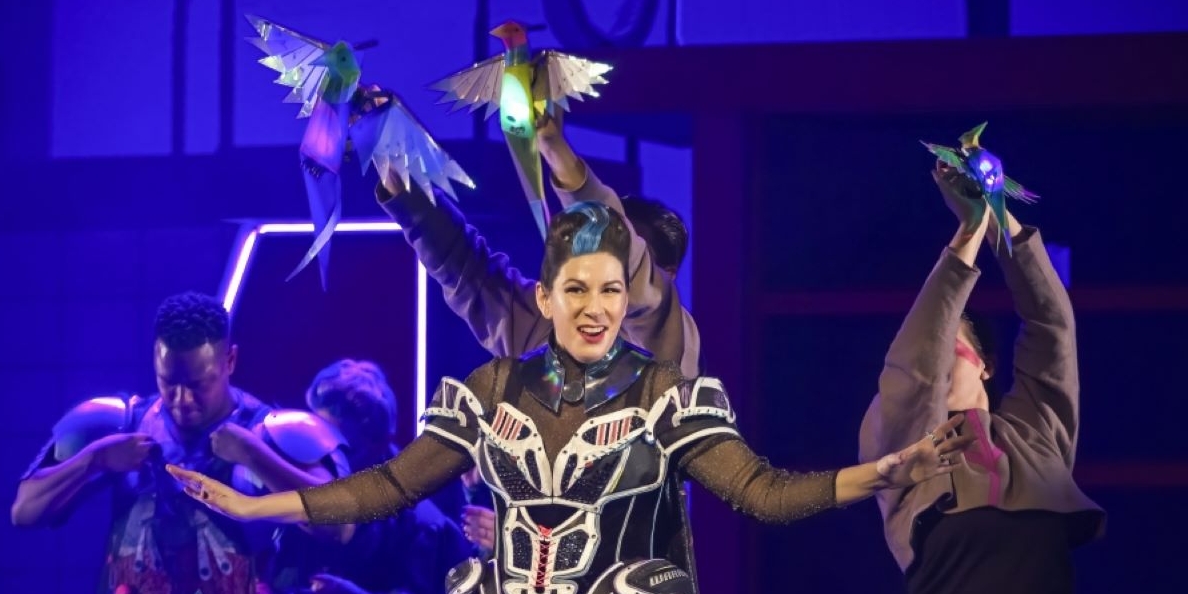Mozart’s Magic Flute is one of those operas that brings out extreme views amongst opera lovers. For some it’s a trivial bit of pantomime redeemed by some nice music; for others it is a masterpiece, where deep human truths lurk beneath a deceptively simple surface. And any opera that begins with the “hero” running on stage and fainting with terror is going to have a problem with being taken seriously. So for Daisy Evans to re-write the libretto – ‘translate’ is really underselling what she has done – is a risk, not an outrage. Instead of the triumph of the sun and enlightenment rationalism over the moon and superstitious faith in old ways, which is the message of Schikaneder’s original libretto, we get a reconciliation of the sun king and the moon queen; a new balance of day and night. And we get all the original music with the new words. It almost works – and with a fair wind and a few tweaks it could be the Magic Flute for the 2020s that the director wants it to be.
Pamina and Tamino are childhood friends, separated following the breakdown of the marriage of Sarastro, the King of Daylight and his wife, the Queen of the Night, who are the parents of Pamina. Sarastro has isolated Pamina away from her mother to educate her about daylight and science, fearing that all her mother teaches her is about darkness and imagination. However, Pamina wants to incorporate both types of knowledge in her world view and reacts against the rigidity of both her father’s and her mother’s ways of looking at things. When Tamino arrives from the realm of night intending to follow the queen’s orders to bring Pamina back to her, he too is persuaded to study the laws of daytime. The young couple have to find their own way through trials and tribulations until they achieve the synthesis of the two conflicting value systems. In this new story, Papageno, the bird watcher, is less the ‘everyman’ companion of the prince and more a jaundiced commentator on the extremes of both the parents’ selfish behaviour and the young couple’s failure to recognise their love for each other.
The performances on the night I saw the production (there are two casts) were – as is always the case for WNO – very strong. Thando Mjandana and April Koyejo-Audiger are well matched as the young couple. Both are powerful, vocally and dramatically, though they do not have – for my taste – ideal ‘Mozartian’ voices. The wonderful Jonathan Lemalu brings his resonant bass to the role of Sarastro, making us share his pain at the loss of his former understanding with the queen. Julia Sitkovetsky, already forging a European career, is a fine queen with a convincing top register, a necessity to carry off the familiar signature arias that are hummed by many who don’t know the opera. Neal Davies brings all his performance expertise to create a new sort of Papageno, less innocent and more cynical than we are used to. Alun Rhys-Jenkins in the small role of Monostatos – transformed from a jailer into a pernickety maths teacher – does a great comic turn against the odds. I have heard the WNO chorus in better form – maybe the men, in particular, found their role as ‘geeks’ in less-than-flattering costumes a bit difficult to inhabit. But the sound from the WNO orchestra in the pit was splendid with Frederick Brown (who shares conducting duties with Paul Daniel) finding a nice balance between pace and space.
The production looks great and the director fills the stage with light and action – the busy puppeteers deserve a mention. But for all the musical and dramatic strengths of the performance, the thing that will divide opinion about this production is the new story. The central idea of Daisy Evans’ version – that of the value of the combination of the strengths of ‘night’ and ‘day’ – is a satisfying concept. Whether it does justice to Mozart and Schikaneder and their message about the triumph of The Enlightenment over cant and superstition is a moot point. But I hope lots of opera lovers go to this production around Wales and England and make up their own minds. The music alone is worth the trip.

